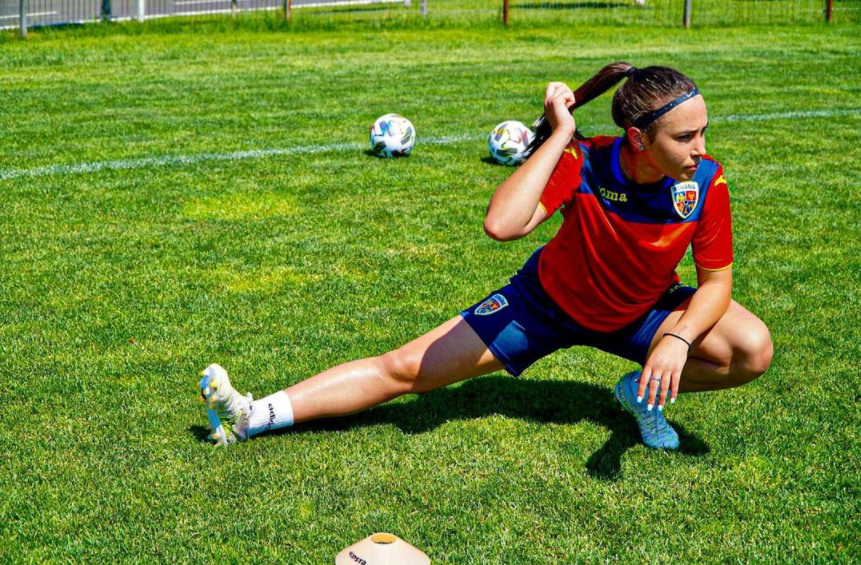
Melinda Nagy, football player: ‘We were considered the weakest and we beat the top-ranking team’
Melinda Nagy is a young football enthusiast who, at the age of 20, has managed to play over 100 national team matches, win seven Romanian titles and play in the stadiums of over 20 countries. She started as a striker for FC Olimpia Cluj, Romania’s top women’s football club. At the age of 14, when she played for the national team for the first time and scored the winning goal, she became a professional player. Here’s her story and how she succeeded.
When did your passion for football start?
‘As a kid, I always liked playing with the ball in my parents’ backyard. When I was nine years old, I started playing for a boys’ team with 20 of my classmates. I remember being the only girl on that team. After four months, the club disbanded. When the coach mentioned a women’s football team in Cluj-Napoca, I figured the best thing to do was give them my father’s phone number in case they were interested. A few days later, they called my dad. My father didn’t even know I was in that selection and that I had played in a team before (laughs). He was completely shocked. The next day, I arrived in Cluj for tryouts. This is where my adventure began, at the age of 9, in the team that was then called Clujana.’
What does a single training session for a footballer consist of?
‘It depends on when we train and what we are training for. For example, if we are at the beginning of a championship and there are tough matches coming up, it’s all very intense. A training session usually lasts about two hours. We run long distances, usually outdoors, followed by short, high-intensity games on the pitch. On the regular training sessions, we start with simple warm-ups and stretches, and a short run. Sometimes we practice possession play and passing.’
Name one of the most memorable matches you’ve ever played. What impact did it have on you?
‘One match I’ll never forget is the one on September 29, 2016, when I played for the U17 national team in Serbia against Belgium. Nobody gave us a chance because we were coming from the last place in the draw. Belgium was the top-ranked team. I remember being in the dressing room with the girls and we all wrote on our hands, ‘Now or never!’. In the 13th minute of the play, our team recovered the ball and we scored. We struggled all game, keeping the score 1-0. Our opponents were much better than us. After the game, we were all crying for joy. We couldn’t believe it. We were considered the weakest, and we beat the top-ranking team.’
How do you recover after a lost game?
‘Seeing how many hours I worked for that moment and not achieving what I wanted upsets me the most. But in football, you have to know how to lose and win. Following a loss, you attempt to analyze your moves and mistakes in order to avoid repeating them in the future. I learn a lot from defeats.’
What was the worst moment of your football career?
‘On March 1, 2019, I was at a tournament in Turkey with the Romanian national team, playing against Uzbekistan. I was injured during the game. Three days later, I found out my cruciate and collateral ligaments were completely ruptured. It was the hardest moment of my career, or more precisely, the hardest moment of my life. I couldn’t believe this was happening to me. I had to have surgery. A month later, I started using walking sticks, and I wasn’t allowed to step on my foot at all. Unfortunately, after three months, I discovered the exercises I had been doing were useless. My foot was getting even worse. Normally, after six months of recovery, I should have been able to run, but the reality was different. I could barely walk on my foot. So I had to change my doctor and extend my treatment under the supervision of another specialist, whom I will continue to see. Luckily, the therapy is working now.’
Have you managed to get through this difficult time?
‘One of the hardest aspects of having an injury is accepting it and believing you’re going to recover and play like before. I blamed everyone for it. I was so upset, but then I realised that everything happens for a reason, and maybe I really needed this break. In a way, it made me grow up. There’s also a strong desire to continue playing further, fulfilling my dream of being part of a top European team.’
What is your ultimate goal?
‘My ultimate goal is to reach a final tournament with the Romanian national team and, on an individual level, to become a player for a strong team in Europe, such as Spain.’
Are there certain benefits a footballer can take advantage of? If so, what would they be?
‘During these years, I have had the opportunity to visit more than 20 new countries and cities. Maybe if I didn’t play football, I wouldn’t have travelled so much. On top of that, I have met a lot of people, and my teammates have become like a second family to me. I learned to work in a team and to be more open and flexible in critical situations. We also take advantage of the sports scholarships. Personally, I have received scholarships in America, at the University of Tennessee, and in Spain.’
Do you have any specific advice for ambitious young footballers who are just starting out?
‘I’ll just say this: I believe that the harder you work, the luckier you get.’
Text: Laurenția Jora, final editor: Andrei Stiru
Photo: © Melinda Nagy



